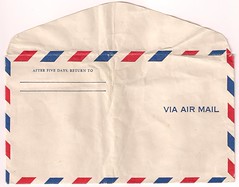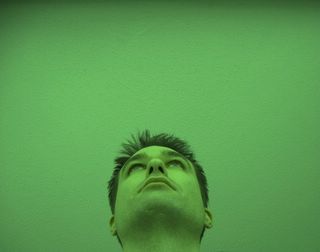The Aunt is a sister of The Uncle, not a wife. She was an amateur artist whose life and art was augmented by schizophrenia. Her art consisted entirely of crayon stylings on mail envelopes and postcards. She was middle-aged and…I can’t remember her face. Odd. Can’t remember her body or her eyes, though I held both that night. When tea was served she gracefully slipped under the table, where we joined her for a cup and a biscuit under the table cloth, while she told us about her date with a clown earlier in the day. I gathered that the clown was not metaphorical but quite real, having just returned from a child’s birthday party and still in costume. They had a picnic in a park. She spoke English as best she could, for my benefit; “There we were, laying on our plates…”
“You were lying on your plates,” asked The Uncle, “and what fine gentleman was eating you?”
She either did not catch his meaning ignored him, “…and then he asked me if I wanted to taste his Bobo? What’s his Bobo?” she asked, turning to me.
I looked to Odlef for rescue, but he only shrugged and drained his cup of tea. We crawled out from the table and moved on to wine, something from Hungary called Bulls Blood. Before opening the next bottle, The Uncle took the empty bottle by the stem and tossed it through an open window, where it cartwheeled twenty feet down and kerplunked into the mote. “Back in the day of our forebears, they always threw their empties into the mote. As a preservationist, it is my duty to uphold their customs in the highest regard. Do as they did, I say.” He laugh was more of a giggle, a bead of wine clinging to his curled mustache.
The Aunt brought our dinner, a half dozen smoked eel in butcher wrap. The Uncle smoked at the table. Odlef was a blond blur at the edge of my vision, laughing and alternating from Dutch to English, though it didn’t matter because I could understand neither. Talk led to my writing aspirations, the state of literature today, the need for a new commune of writers like the Lost Generation. Who would be our Gertrude? Was Odlef our Fitz drinking away his talent? I was none of the above, but they saw in me what they wished. When I talked about Morrison and wanting to be a visionary, and about Artaud and Rimbaud and how writing could be inspired by the unsettled mind, I forgot to whom I was talking. The Aunt cautioned me about romanticizing mental disorder. Was it worth the price, in the end? As if in explanation, she escorted me from the dinner table to the makeshift studio The Uncle had set aside for her in one of his many rooms. She opened the door to a simple room; four walls, a table, a chair, but plastered across the walls and ceiling were hundreds of envelopes, each consumed by brightly colored flames, curling at the edges, wrinkled, pressed flat again. On the floor they gathered like so many fallen leaves. Each burned and yet did not expire; they were only crayon flames, I realized, and the crayons that ignited them were scattered across the table, some snapped in half like broken fingers or rubbed down to the nubs. I looked more closely at the envelopes and found that not all were only made of colors following the folds of the envelope, but some also held stick-drawings of bicycles and trains and boats and planes, suns and flowers and sons and daughters.
It wasn’t good. I didn’t get it. I felt deflated. I wanted her to be brilliant, but she didn’t care to be, knew she was not, aspired to be nothing but who she was. At twenty I didn’t appreciate that. At forty I wonder if you grow up or grow in. At sixty I hope to understand if the evidence of that growth, the product of all my exploration, like her colored envelopes, is meant more for myself or others. Shit, who cares.
We went back upstairs and drank and smoked, stacked dishes and tried to fish empty bottles from the mote. I fell asleep on the sofa with the aunt. Awoke in a tangle of limbs and clothes in ray of blinding sun.
It was a morning of hangovers and shame, putrid cigarettes and cotton mouth, bad smells lingering in the rooms from the night before. While The Uncle brewed a pot of strong black coffee, I drew away from the group and slipped out the door to the castle grounds still wet with dew. I walked down winding cobbled paths, through a maze of wood neatly stacked in cords, through the shade of the trees spared from emperor’s ax, and by the time I made it through the maze to the mausoleum, I had in my mind the beginnings of what would be my first novel.
Odlef and I stuffed our backpacks to catch the last train home. The Aunt presented me with her latest envelope creation, which she must have colored over her morning coffee. Was it something in the image she drew in childlike crayon, or was it in the recognition of her chosen medium — an envelope? Whichever caused these chemicals to collide, I had received her message carried over a great distance, not only the very real ocean that would soon divide me from my grand tour of Europe, but also a message that bridged the space between her art and the irrational world in which she had learned to live, and with which I was only now coming to terms.
Subscribe to:
Post Comments (Atom)


No comments:
Post a Comment